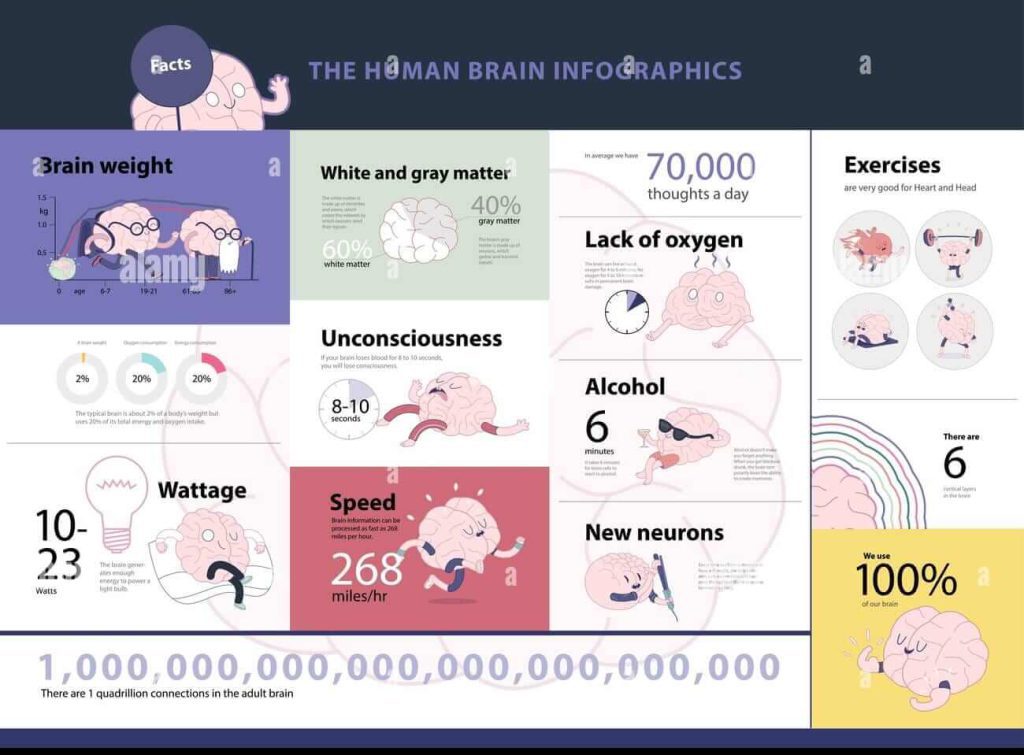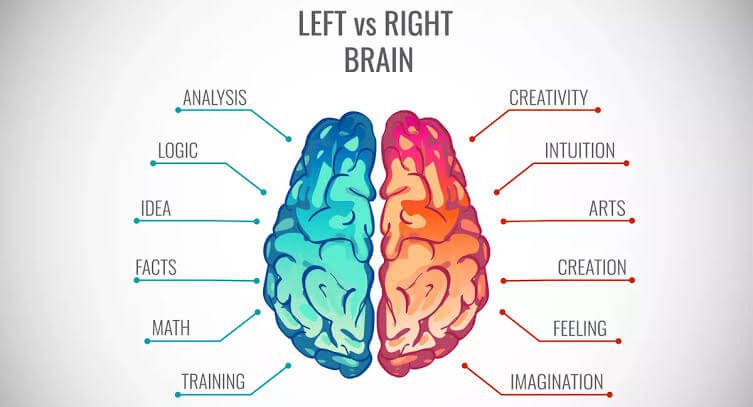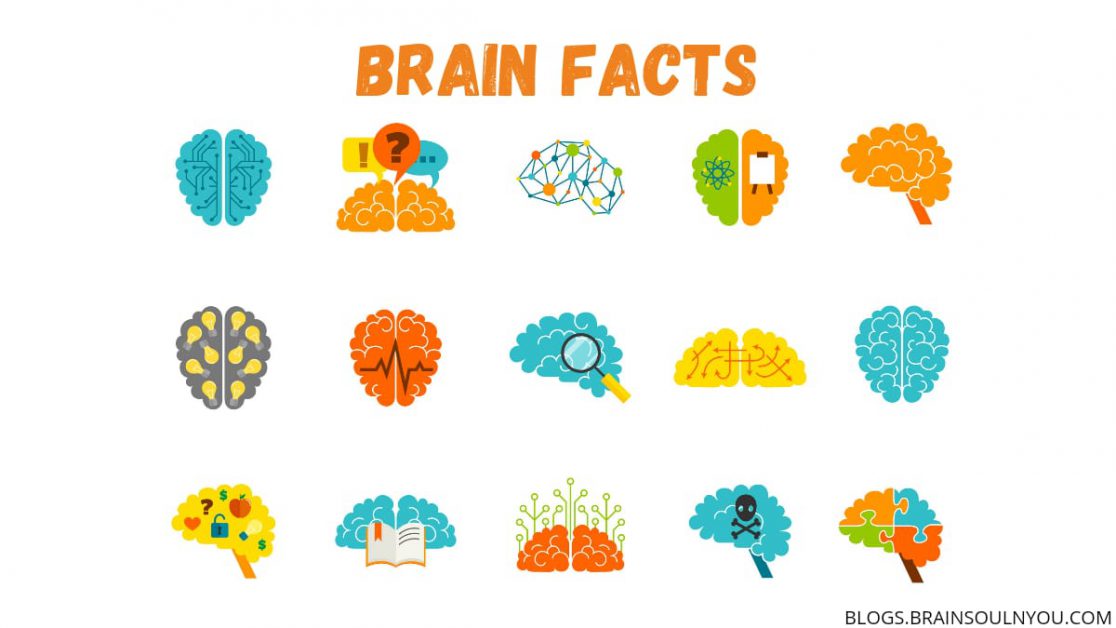The study of the human brain is one of the least explored areas in science. Even experts agree that we don’t know much more about the brain than we currently know. In recent years, our knowledge of the brain has exploded, much of what we know about the brain has been discovered in the past 15 years. So, many facts about the human brain have not yet found a place in the public’s awareness.
Mind-Blowing Facts of the Human Brain
The most complex expression of intelligence we know of resides between our ears. Certainly! Here are 50 mind-blowing facts about the human brain:
1. The human brain weighs about 3 pounds (1.4 kilograms).
2. It is composed of approximately 86 billion neurons.
3. The brain uses about 20% of the body’s oxygen and energy.
4. The brain can generate approximately 10-23 watts of power, enough to power a light bulb.
5. The brain is made up of about 75% water.
6. The brain contains about 100,000 miles (160,000 kilometers) of blood vessels.
7. The human brain continues to develop and grow until the age of 25.
8. The brain can process information at a speed of about 268 miles per hour (432 kilometers per hour).
9. The human brain can store an estimated 2.5 petabytes (or 2.5 million gigabytes) of information.
10. The brain can produce new neurons throughout a person’s life in a process called neurogenesis.
11. The brain can generate and sustain about 50,000 thoughts per day.
12. It is estimated that the brain can make up to 20 million billion calculations per second.
13. The brain is divided into two hemispheres, with each hemisphere responsible for controlling the opposite side of the body.
14. The brain can process and interpret information from the outside world in just a fraction of a second.
15. The brain can recognize and differentiate between approximately 10,000 different smells.
16. The brain uses a network of approximately 100 billion synapses to transmit information.
17. The brain can create new neural pathways and reorganize itself in response to learning and experiences.
18. The human brain has a folded surface, which increases its surface area and allows for more neurons to be packed within the skull.
19. The brain produces and releases various neurotransmitters, such as dopamine, serotonin, and adrenaline, which play a crucial role in regulating mood and behavior.
20. The human brain can process and understand complex languages, enabling communication and expression of ideas.

21. The brain generates electrical signals known as brain waves, which can be measured and analyzed using electroencephalography (EEG).
22. The brain is responsible for controlling and coordinating all bodily functions, including movement, speech, and digestion.
23. The human brain has a high demand for glucose, requiring a continuous supply of energy-rich nutrients.
24. The brain has a natural protective barrier called the blood-brain barrier, which helps regulate the entry of substances from the bloodstream into the brain.
25. The brain is incredibly adaptable and can undergo significant changes in response to injury, trauma, or rehabilitation.
26. The human brain has different regions specialized for various functions, such as the frontal lobe for decision-making and the temporal lobe for auditory processing.
27. The brain’s hippocampus plays a crucial role in memory formation and consolidation.
28. The brain can perceive and interpret emotions through the amygdala, a region responsible for emotional processing.
29. The brain’s cerebellum coordinates and regulates muscle movements and balance.
30. The brain’s prefrontal cortex, responsible for executive functions, continues to develop and mature into early adulthood.
31. The brain can process visual information at an incredibly fast rate, allowing us to perceive and interpret our surroundings.
32. The human brain can imagine, create, and innovate, giving rise to art, music, and technological advancements.
33. The brain’s basal ganglia is involved in motor control and plays a role in habit formation and reward-based learning.
34. The brain’s prefrontal cortex is responsible for higher-order cognitive functions, such as reasoning, problem-solving, and self-control.
35. The brain’s temporal lobe is involved in language processing and comprehension.
36. The brain’s occipital lobe is responsible for visual processing and perception.
37. The brain’s parietal lobe integrates sensory information and helps with spatial awareness and perception.
38. The brain’s motor cortex controls voluntary movements and coordinates muscle actions.
39. The brain’s somatosensory cortex processes sensory information from the body, such as touch, temperature, and pain.
40. The brain’s hypothalamus plays a crucial role in regulating basic physiological functions, such as body temperature, hunger, and thirst.

41. The brain’s medulla oblongata controls vital functions like breathing, heart rate, and blood pressure.
42. The brain’s pons helps relay messages between different areas of the brain and is involved in regulating sleep and arousal.
43. The brain’s reticular formation regulates consciousness, alertness, and sleep-wake cycles.
44. The brain’s corpus callosum connects the two hemispheres, allowing for communication and coordination between them.
45. The brain’s thalamus acts as a relay station, transmitting sensory information to different regions of the brain.
46. The brain’s frontal lobe is responsible for higher-level thinking, decision-making, and personality traits.
47. The brain’s limbic system, including the amygdala and hippocampus, plays a role in emotional processing and memory formation.
48. The brain’s temporal lobe is involved in auditory processing and language comprehension.
49. The brain’s occipital lobe is responsible for processing visual information and allowing us to see the world.
50. The human brain is a remarkable and complex organ, responsible for our thoughts, emotions, memories, and overall human experience. Its intricacies continue to be a subject of scientific exploration and fascination.
These are just a few of the many fascinating facts about the human brain, showcasing its remarkable capabilities and importance in our lives.
Read more on Chemical in Brain, Split Brain Theory, and How the Brain Constructs Dreams?
Love,
Saurabh Goel
Saurabh Goel
He is the Founder and CEO of the Training and Counselling Company ‘Brain Soul & You’. He is an NLP Wellness Coach, Life Coach, Brain analyst, and Trainer for Education, Corporate, and Entrepreneurship. For more than 7 years, he delivered presentations on entrepreneurship, mind programming, and motivation. He did his B.tech in IT and later choose to be a successful psychologist. He is helping people in various ways through his counseling and training sessions.


